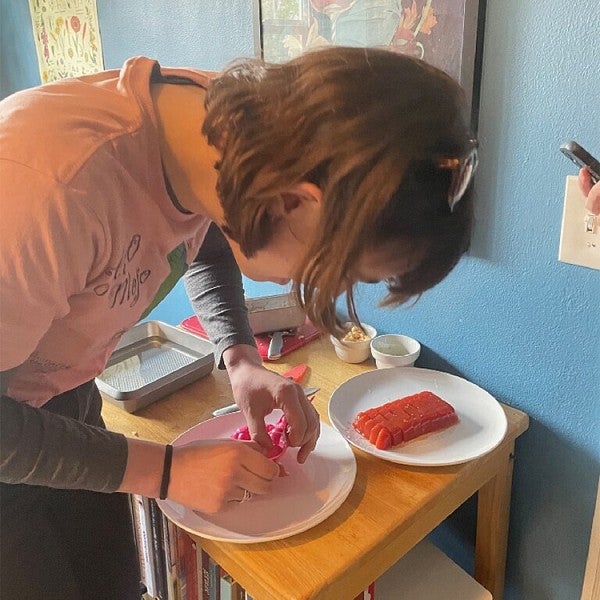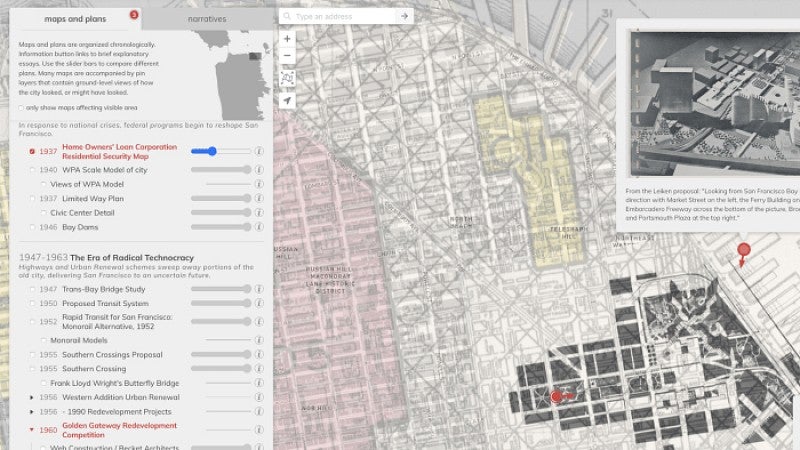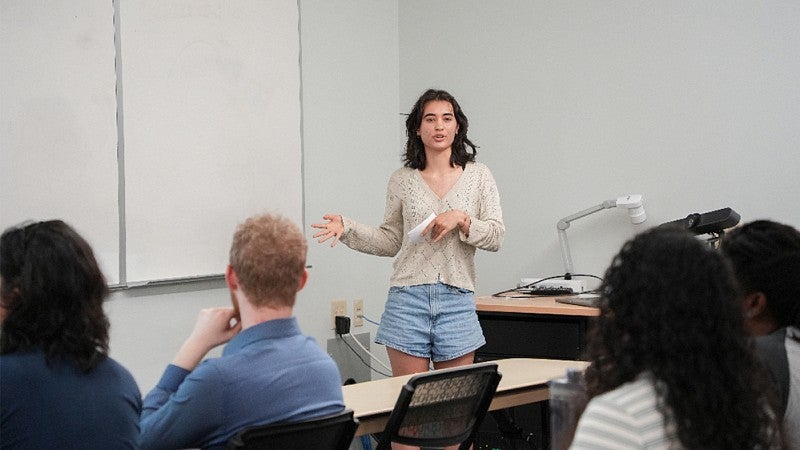
Experiential Learning | Research & Innovation | Community Impact | Career Preparation | Teaching Excellence | 21st Century Liberal Arts | Building Community | Good Vibes | CAS Spotlights | All Stories | Past Issues

September 27, 2024
Taking Liberal Arts to the Next Level
One of the most unpleasant dishes Allia Service ever cooked was jellied tomato salad from a 1925 recipe published in the Oregonian.
The ingredients were simple: tomato puree, beef broth, chili sauce, salt, paprika and a garnish. But the initial attempt was “a massacre of tomato and celery that looked hauntingly like raw meat,” she wrote in a blog post two years ago.
Service created her cooking blog, in which she demonstrated early 20th-century recipes from the newspaper’s antiquated “Dear Miss Tingle” column, as part of her capstone project for the digital humanities minor, a program in the College of Arts and Sciences that encourages students to explore the relationship between technology and culture.
Not only did the project offer a fascinating deep dive into the history of middle-class domestic science, but Service was able to parlay the digital skills she developed into a full-time job after graduation. As an open education resources (OER) specialist for the University of Oregon’s Knight Library, she now supports UO faculty who are seeking to adopt, adapt or create OER—no-cost textbooks and other learning materials that are freely shared and adapted for student use.
“I was pretty interested in digital history and anything connecting history to the public,” says Service, who graduated in 2022 with a history major and a digital humanities minor. “I wanted to build more technical skills, and I was really excited about doing original history research and doing something on the digital side with it.”
The minor, which launched in 2019, is just one example of a wave of change that’s sweeping across CAS as faculty members rethink how they conceive, teach and evaluate courses in the liberal arts.

Delivering on the promise of a 21st-century liberal arts degree is a cornerstone of CAS's new five-year strategic plan. The high cost of a college degree, combined with the challenges of succeeding in a technology-driven workplace, have led the public in the United States and beyond to increasingly question the value of a liberal arts degree. Higher education institutions like CAS are responding by giving the liberal arts an update for the digital age, with a focus on preparing students to solve the world's complex contemporary problems.
"The way we do our work in the liberal arts is changing so fundamentally, and we need to have a space that has the flexibility to be responsive to that,” says Mattie Burkert, associate professor and director of the digital humanities minor.
Far from becoming obsolete, the liberal arts are more important than ever, higher ed experts emphasize. The core skills they impart to students, from critical thinking to the ability to synthesize and communicate information, are some of the most highly sought among employers. They’re also crucial in preparing students to become effective global and digital citizens.
“The evidence suggests that people are going to have many jobs over the course of their lifetime,” says Jamie Bufalino, associate dean for undergraduate education in CAS. “Some of the jobs students are going to have later in their career don’t even exist yet. We don’t entirely know what kinds of knowledge they’re going to need, but if they’ve got the ability to learn; to quickly synthesize information; and to analyze qualitative, quantitative and, to an increasing degree, visual content, they’ll be able to adapt to things as they change.”
To prepare students for these future jobs that don’t yet exist, educators are increasingly recognizing the need to evolve the way the liberal arts are taught so they can meet students’ needs in a rapidly changing, tech-centric workplace.
“The core part of liberal arts that’s timeless—critical thinking and the ability to take in, consider and communicate information—is something we have always emphasized across the curriculum. That’s the bread and butter of what we do,” says Elliot Berkman, divisional associate dean for the natural sciences in CAS. “But the kinds of information students need to process critically is changing. We’re adapting to things like computational and data fluency quickly becoming critical skills for students in any field.”

Embedding job skills into academic coursework
Last spring, a group of undergraduate students conducted a thorough data analysis for CAHOOTS, a local mobile crisis response organization that often serves as a first contact for connecting and transporting clients to other support services.
Their goal was to help the nonprofit maximize its effectiveness by converting raw data from the field into insights that can inform future data-driven decisions about the organization, including its intervention model, staffing and operations.
“We can apply everything we’ve learned in our data science courses and be able to help people in our community and actually give back in a way,” says Mia Hanson, a fourth-year data science major.
Authentic research projects and other experiential learning opportunities not only help undergrads develop crucial job skills, but they demonstrate concrete applications for the techniques students are learning in class, says Rori Rohlfs, associate professor of data science who developed the experimental Applied Data Science for Social Justice course and partnered with CAHOOTS for the pilot class in spring 2024.
"We know that when students are engaged in research, they’re much more likely to graduate and they’re more likely to have positive post-graduate outcomes,” she says. “When students engage in research, they get excited, they get motivated, and they understand why they need to learn these techniques.”
The technology skills required for tomorrow’s jobs will extend far beyond basic software proficiencies such as the ability to use a spreadsheet or create a PowerPoint presentation, says Reza Rejaie, professor and head of the Department of Computer Science. Future graduates will be working with new types of applications designed to meet new on-the-job needs.
“One example is: I have a lot of data, and I want to make sense of it. Is my data accurately representing the problem? Are there interesting patterns and dependences between different dimensions of my dataset—for example, does our investment in new equipment or servers result in higher productivity for our team?” he says. “To me, the most critical thing students can learn is the ability to harness the capability of this new generation of tools.”
All across CAS, researchers in nearly every discipline from psychology and linguistics to physics and Earth sciences are incorporating emerging technologies such as machine learning into their research—and the same is true for non-academic workplaces in just about every field. To take advantage of these tools, employers need workers who can bring together both technology skills and discipline-specific expertise.
That need propelled the creation of CAS’s School of Computer and Data Sciences in 2023. One of its strategic goals is to support students from all disciplines in developing computational and data analysis skills, Rejaie says.
“Once you’ve given them computational skills beyond a certain point, skills that are essential in that interdisciplinary domain, they know enough that they can sit between domains,” he says. “In the future, those are the people who will be in more demand because they know that intersection.”

Helping students connect the dots
Core education offers an additional opportunity for students to round out their professional skill set. Nearly every UO undergraduate comes through CAS to meet their core education requirements.
For students who are still exploring, core ed can expose them to a variety of academic possibilities to help narrow their search for the right major. But for those who have already homed in on a specific career goal, these foundational courses can help them develop supplemental knowledge and skills in areas that will help support their career goals.
However, many students neglect to capitalize on this opportunity, Bufalino says.
“Students seem to view core ed primarily as hurdles to get over in order to reach their degree, rather than thinking about core ed in a way that’s intentional and fundamentally highlights the connections between core ed and the set of knowledge and skills they’re developing with their bachelor’s degree,” she says.
Academic advisors in CAS play a key role in helping students strategically choose courses that will help them develop the job skills they will need within their chosen field, Bufalino adds. The right combination of core ed classes, along with a complementary major and minor, can set a student up to work in a niche job at the intersection of their various interests, or it can help them build a broader set of skills that will qualify them for many different jobs over the course of their career.
On the teaching side, faculty members can help students think more intentionally about what they’re learning by adopting practices such as the transparent assignment template, a technique that’s gaining nationwide traction. The template consists of an assignment sheet, to be given with each assignment, that clearly states its purpose within the course as well as its broader purpose for students’ lives—including which skills they’ll develop in the process.
“This practice has been shown to really improve student success on assignments,” says Lee Rumbarger, associate vice provost for teaching engagement and director of the UO’s Teaching Engagement Program. “Knowing why we’re asking them to do things is motivating. I hear more faculty starting to pull back the curtain more for students, which helps orient students to do the thing.”
Assessments are also changing in response to the digital revolution. Project-based assessments that allow students to demonstrate their learning through digital projects such as blogs, videos, data mapping or informative websites not only help alleviate concerns about the use of artificial intelligence tools to cheat on exams, but they give students the opportunity to combine their tech skills with what they’ve learned in class to create a tangible product they can share with the public or with prospective employers.
“I think many faculty are working toward what we call authentic assessments—students showing their learning through assignments that feel relevant and important,” Rumbarger says.
Several faculty members, including professors in linguistics and anthropology, have their students contributing to open education resources, for example. “The students are actually creating textbooks that future students will use,” she says. “That’s authentic.”
In Dorothee Ostmeier’s German and folklore classes, students showcase their learning in a variety of ways. They’ve engaged with artists, art collectors and scientists in the Lokey Lab to explore how the power of the imaginary and fantastic impacts artistic work as well as scientific experiments. They’ve organized art exhibitions, hosted public lectures, written their own stories and even produced a storytelling video.
For Ostmeier, a professor of German as well as folklore and public culture, these types of projects aren’t just about preparing students for careers. They harken back to one of the primary benefits of a liberal arts education: the ability to communicate across cultures, appreciate diverse experiences and ways of thinking, and approach the world from a broader perspective.
“I want to open the window to the classroom and invite the world in,” Ostmeier says. “I want to engage students in improving the lives of others. Students are of course interested in their own careers and their own good grades, but this cannot happen if we lose sight of our 'response-ability'—a term fashioned by Donna Haraway—in society.”
—By Nicole Krueger, College of Arts and Sciences
